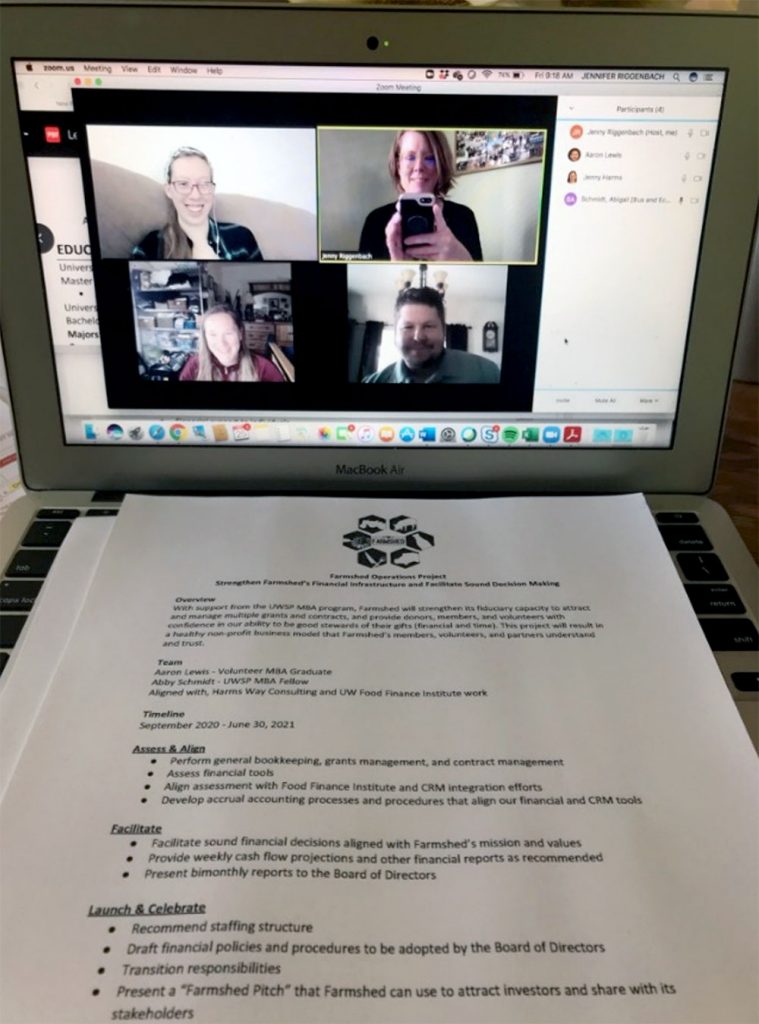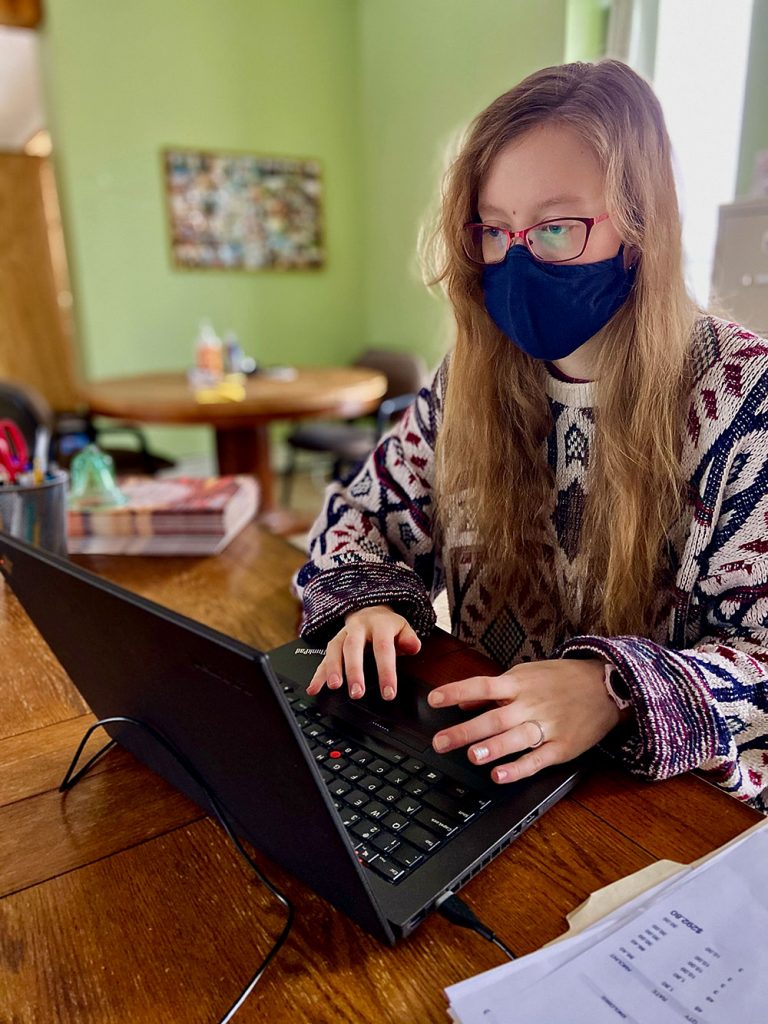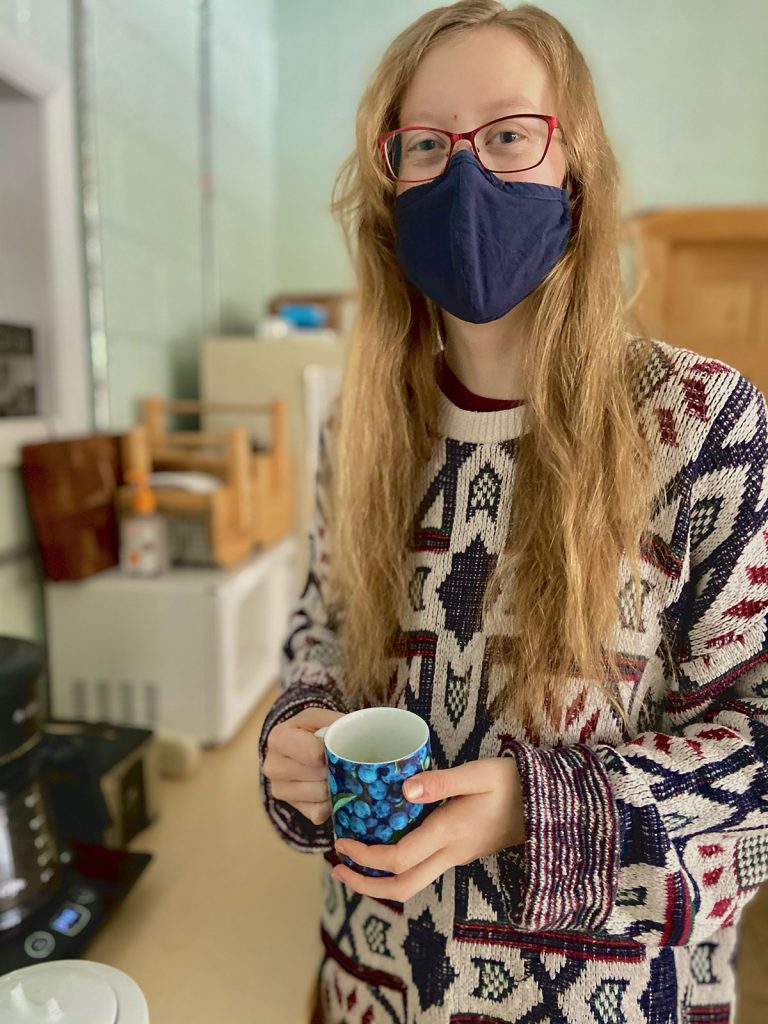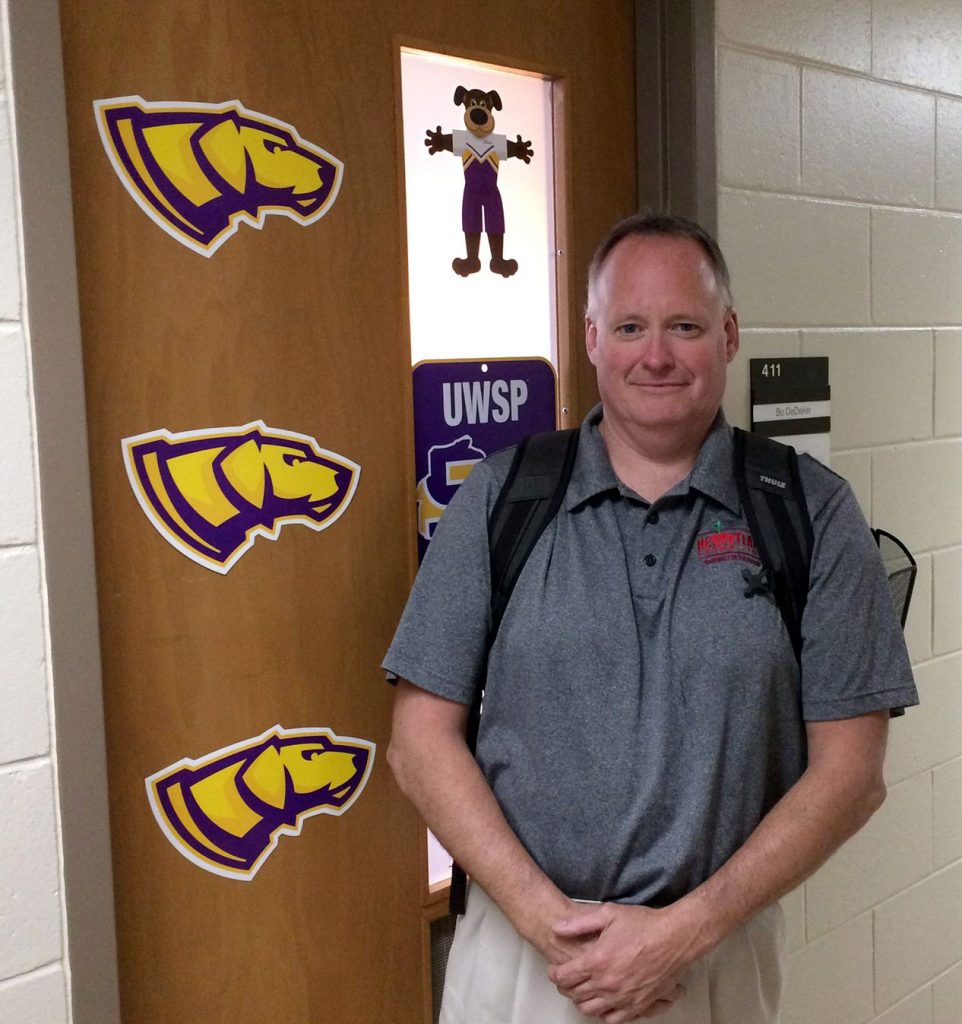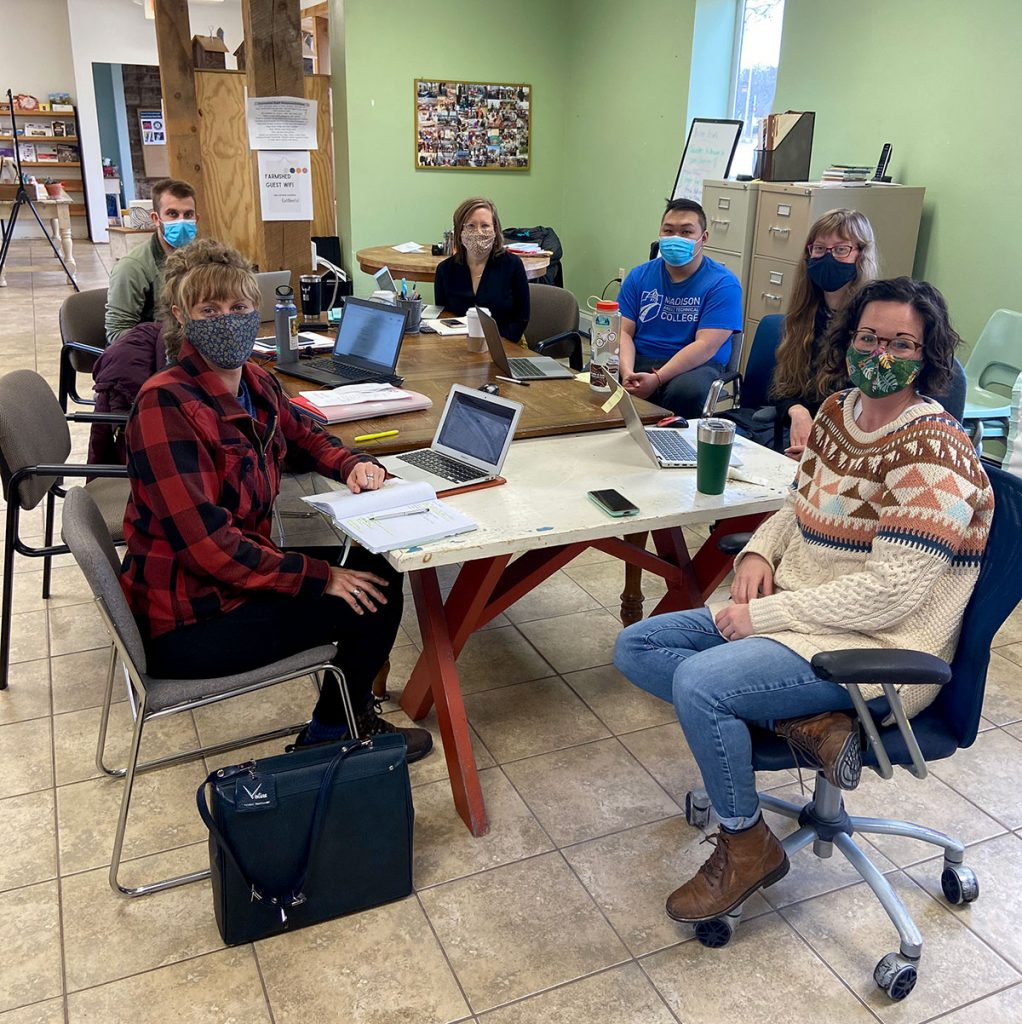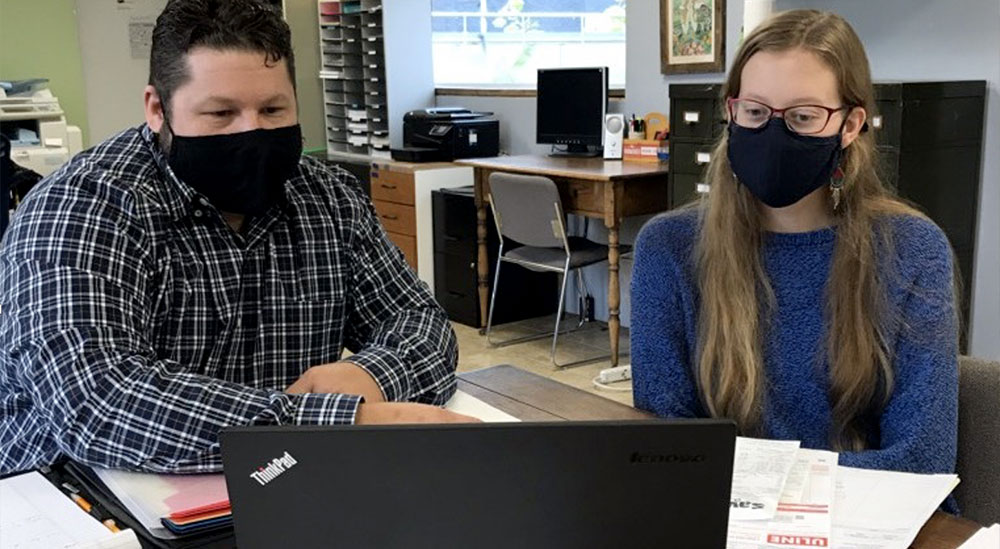
Introducing the UW-Stevens Point MBA #FellowshipFriday feature, a new nine-part series on the first Friday of each month when MBA candidate Abby Schmidt provides an inside look on her fellowship with Central Rivers Farmshed.
November 2020: Introduction
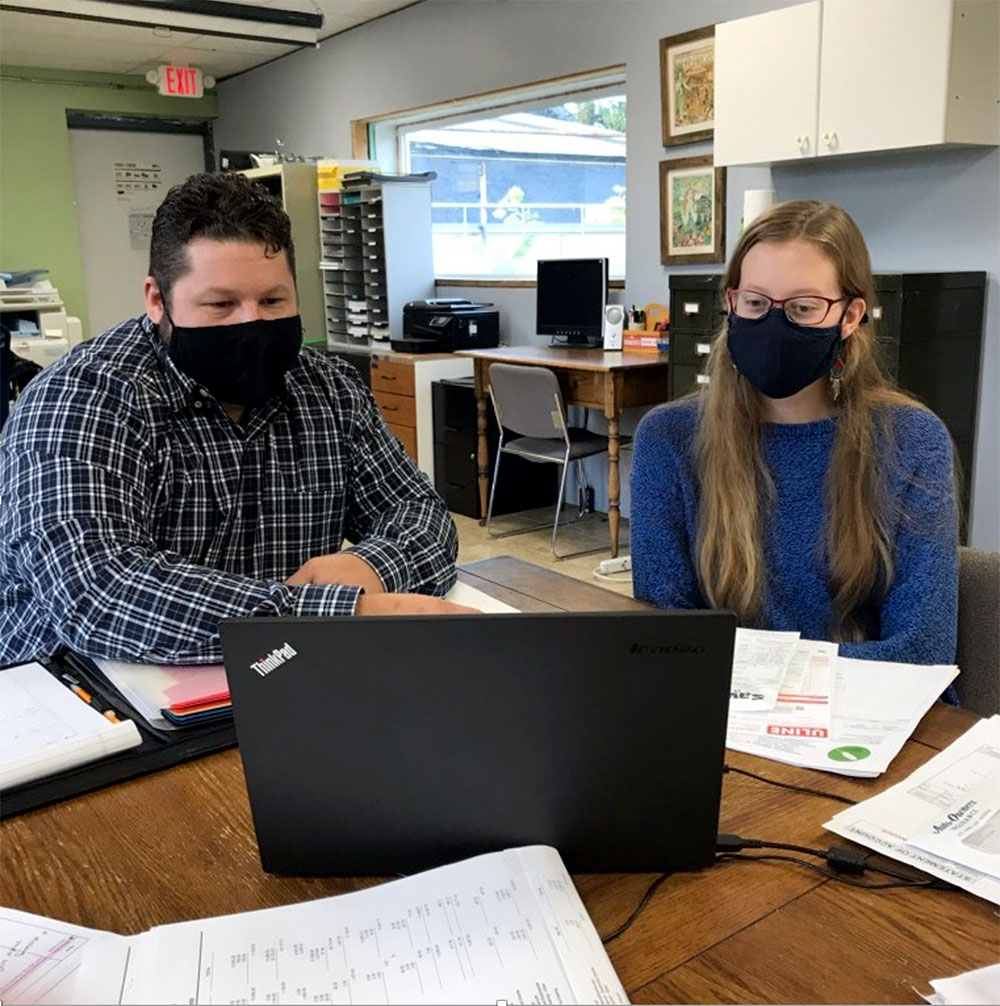
Starting a fellowship with Central Rivers Farmshed put me on a team whose mission was to produce “a healthy non-profit business model that Farmshed’s members, volunteers and partners understand and trust.” Unbeknownst to me at that time, Farmshed’s mission to grow a resilient local food community has been a key factor in developing the local economy and the Stevens Point community for more than a decade.
Joining this team has opened my eyes to the widespread impact this seemingly small organization has on farmers, students, families, entrepreneurs and more (the list goes on) through their programs and events. Our mission as an accounting team is to develop accounting practices for Farmshed that are every bit as wholesome and reliable as the company’s mission and values.
Our mission included three parts:
- Assess financial tools and align them with Farmshed’s goals and operations
- Facilitate sound financial decision-making
- Launch Farmshed into a sustainable business structure and present a pitch explaining why Farmshed is a worthy investment
I am privileged to begin my fellowship by working with Jenny Riggenbach, the executive director of Farmshed, and Aaron Lewis, an alumnus of the UWSP MBA program. Aaron’s work on Farmshed’s financials prior to me joining the project helped set us up for success so we can dig into where we are and where we need to go.
December 2020: Agility
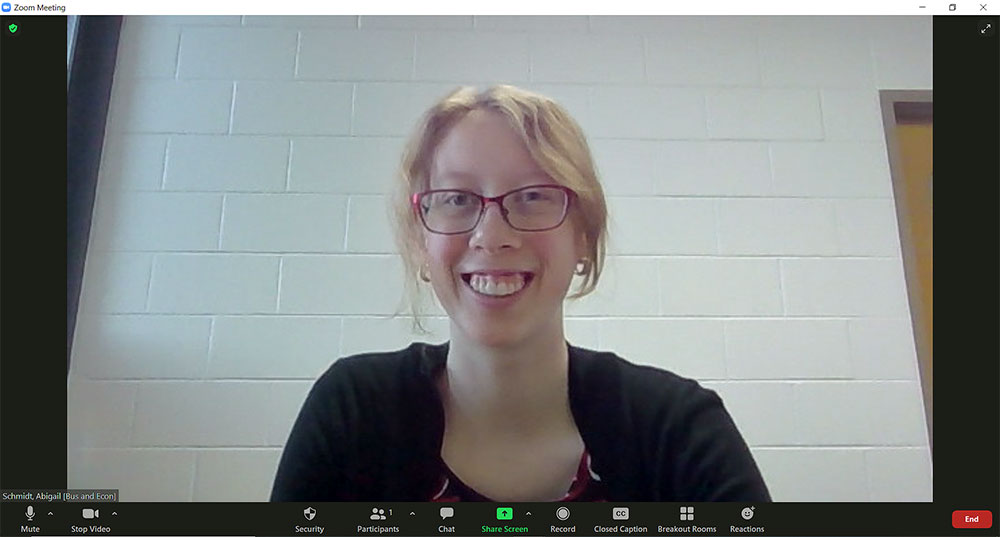
Joining such an experienced and dedicated team has so far challenged and motivated me in my learning agility. For this project that we are taking on, a fixed mindset is not an option; adapting and growing are competencies that are essential for the success of our team. However, just because I know this does not mean that it has been easy for me to step outside my expectations and adapt to uncertain conditions.
Though I understand that the world is a volatile and uncertain place, I am regularly surprised by the fact that the next step in a project is not always clear. It surprises me sometimes that I still have the expectation that life will be clear, but I still am caught off guard by the expectation being unfulfilled. I am far too accustomed to have others lay out my work for me so I can just do what I’m told; the only responsibility on me is doing it well. However, in the “real world” as we college students like to say (apparently we are not in the real world yet), you often have to create your own projects, find your own work, and figure out problems on your own. This is one aspect of school that does not generally prepare its students for what a professional career will be like. Each assignment has well-defined, clear directions because if it doesn’t, every student will complain that the teacher or professor is not being clear enough. My MBA professors have been intentionally thwarting that expectation, but that is generally what previous schoolwork has entailed.
From being in school so long, I have been pretty comfortable living this life of being told exactly what to do, so much so that having unclear directions or being responsible for the direction of a project can be frustrating and daunting. Living a life of agility requires shaking up the foundations of what you are comfortable with. Nothing will make this more apparent than life throwing you a curve ball and saying, “Think fast!”
In my case, that curve ball was my family getting COVID-19. I went home for a weekend just to visit for two days, but because my dad got sick on the day I was supposed to leave, the stay ended up being more than three weeks. My mom got it next, along with my sister and brother-in-law who visited us the day my dad got sick, and then I got it. I clearly couldn’t go back to Stevens Point for fear of spreading it to my roommates or anyone else, so I settled into the new environment. The plan to stay in my hometown generally seemed like it would work out well; I could do my work as a graduate assistant remotely, and I had the laptop to work on things for Farmshed. However, when Farmshed had a deadline for sending checks out that Friday, and I had the only computer that could print them, suddenly the pivot seemed a bit more complicated.
Jenny, Aaron and I jumped into brainstorming to figure out how we could still make the deadline without requiring me to come back to Stevens Point. This seemed impossible at first, so I got ready to make the two-hour drive to Point on Friday and work from my car in the Farmshed parking lot to make it happen. However, as we mulled over some other ideas, inspiration struck: why not just print to PDF and email the checks to Jenny? Ultimately, though the solution wasn’t perfect, it served our purposes, and we got the checks out on time.
This kind of thinking and flexibility is essential in the modern workplace, especially during COVID times. However, it is decidedly not easy to do, and it can put an extra burden on others. Jenny now has even more on her to-do list in order to ensure that I can do my job for her. While I was supposed to be helpful to her and the organization, I am instead demanding more from her in order to be helpful. However, this problem has less to do with unexpected changes, COVID or me specifically and more to do with the system out of which Farmshed operates.
The inflexibility and disorganization of the system we have to work with is precisely the reason that Farmshed has given me this fellowship. Situations like this where the unexpected throws off our plans and everyday work activities really put that issue into sharp relief. I hope that my work in revamping some of these processes and norms will help Farmshed have a sustainable financial model and remain an agile and viable nonprofit for many years to come.
January 2021: Passing the Torch
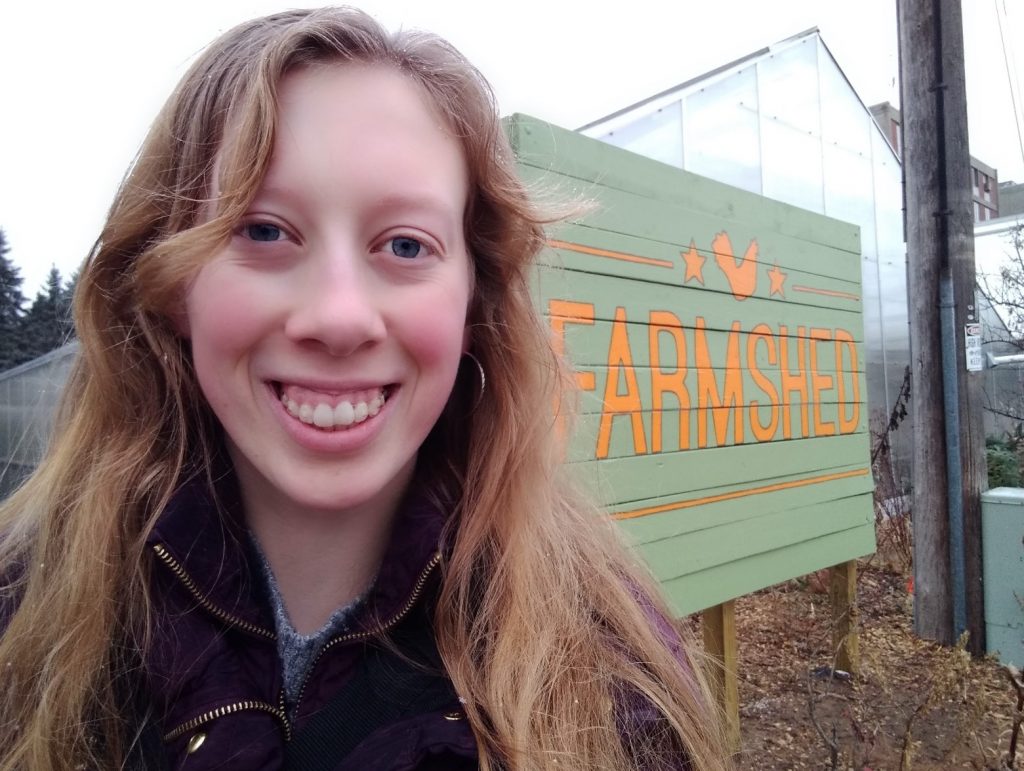
Another aspect of this work with Farmshed is that our overall goal has very little to do with Aaron or me and much more to do with whoever will take over our role in the future. I am accustomed to being in a work environment where the goal is to add value, move up (or forward) in your career and stay as long as possible. Longevity is often prized in the workplace, as it shows evidence of perseverance and likelihood to stay. In my own research experience with professors Nik Butz and Reed Stratton and research assistant Emily Gruber, I learned a great deal about the detrimental effects of turnover in a business and the importance of hiring workers who will stay long-term. When an organization invests a lot of time and money into training and cultivating a worker, they understandably desire to keep that worker for a long time, if only so they don’t have to invest that same amount of money and time again to replace that employee.
With all this that I’ve learned, my work at Farmshed has turned that expectation sideways. My position there is entirely created with the intent of it being impermanent. Though they are investing in me, I feel more like my role there is to invest in them. It is honestly a bit strange to be in a role where I know I will be leaving in a few months. This isn’t my first internship experience, so I have felt that feeling before, but the purpose of my role at Farmshed is different than it was at my tax internship. There, my objective was to earn money and school credits, do my work well and gain some good experience in the accounting field. There wasn’t really an end goal, except perhaps to be satisfied with my overall performance there, maybe even to see whether I would fit at that organization in a more permanent position. At Farmshed, my entire purpose there is to pass the torch off to someone else. The end goal of this fellowship is to do my job so well that I am not needed.
This role is both fulfilling and terrifying, as the organization depends not only on me and what I do day-to-day, but rather more on how my work will impact the organization for years to come. It’s a chance to make my mark, but it’s also a chance to make or break the organization. Well, that’s a bit dramatic; the fate of Farmshed does not rest on my shoulders alone, not even close. I am but one small contributor to a vast network of people and organizations that keep Farmshed working, who in turn helps other organizations endure and thrive. Still, what I do at Farmshed matters, and I often feel unequal to the task.
On that front, I cannot express enough how grateful I am for Jenny Riggenbach and Aaron Lewis for their own contributions to this project. Aaron has done so much for Farmshed and has guided me through this fellowship so far. He dug deep into the financials and found where many of the opportunites lay, and he continuously gives me advice and direction when I feel lost or don’t know the answer. Jenny champions this project and expertly utilizes her deep understanding of Farmshed to answer our questions, consider new possibilities and tap into my own perspective and experience. She constantly encourages me and thanks me for my work, reassuring me that what I do there is valuable even when I feel inadequate. I’ve said it before, but I am so grateful to be part of this team and to have the chance to expand my network and gain valuable experience while making a significant impact in the community of which I am now a part.
February 2021: Mistakes
I feel like a failure sometimes. You ever get that feeling? If you’re human, I’m assuming that you felt that way at least once in your life. As the adage goes, “To err is human.” I think we quote that proverb because we think it is comforting to know we are not alone, that mistakes are part of life. However, it is only comforting to me in a general sense. In the face of a specific failure or mistake, I have a hard time accepting that THIS mistake cost someone else, that THIS failure actually happened and I have to suffer the consequences. When you look in the eyes of the person whose expectations you’ve disappointed, or ruminate on all that you should have done in a situation but didn’t, the innate humanity of mistakes brings little consolation.
I have felt like a failure many times in my relatively short life so far, but the worst is when I feel unequal to a task or when someone’s expectations for me went unfulfilled. I’ve experienced both during my time in this fellowship, and it doesn’t get any easier to deal with, no matter how often I feel the crushing weight of others’ disappointment – or more often, the disappointment I feel in myself. I have so often felt inadequate to the task set before me and have been afraid of messing up. It’s daunting to have a lot riding on my somewhat inexperienced shoulders.
So much good has happened during this fellowship, however, and I have recently experienced an exciting time of forward progress and success. I do not wish to paint a bleak picture of my time here and focus on what hasn’t gone well. On the contrary, I talk about this because I am learning just as much from my mistakes and insecurities as I’ve learned from my successes, perhaps more so.
First, let’s talk about disappointing people. I disappointed someone in this fellowship very recently by forgetting an appointment, and it caused frustration. Honestly, this is even harder for me to deal with than when I do something morally wrong. When I know I intentionally made the wrong choice, I can accept it, apologize to whomever I wronged, and move on. When I didn’t make a conscious decision to mess up, however, and I just forget about a responsibility or fail to meet someone’s expectations, I constantly play the scenario over in my head and wish I could undo it. But I can’t.
Sometimes I get stuck there. I messed up, I can’t fix it. I’m stuck in the cycle of shame and regret. So how do I move forward? How do you get out of the rut?
I feel like I’m still learning the answer to that question. Here’s what I’ve learned so far: I have to accept myself, mistakes and all. I can’t continue to beat myself up over my failures. That mindset of needing to perform exactly right is a killer of joy because I’ll never measure up. There will always be someone I will fail. There will always be some details that slip through my fingers. I will never be enough if I am trying to be perfect. I have to remind myself: it is OK to fail. It is OK to not be successful in everything that I try to balance. It is OK if I accidentally hurt, annoy, or frustrate someone. It is OK.
Inside, I don’t want to accept that. It shouldn’t be ok to cost someone else time and money! I shouldn’t just accept failure; I should constantly be striving to better myself and produce excellence, right? Well, yes, that is also true. That’s what makes this issue so hard for me to come to a conclusion on. I still wrestle with the dichotomy every time I mess up or feel like I’m not enough.
The problem is when I take those failures and ascribe them to my IDENTITY, and THAT’S what is not OK. I make mistakes, but I am not a failure. I disappoint people sometimes, but I am not a disappointment. I may not feel like I have enough skill or experience, but I am enough. I am who I am, no matter what I do. My successes do not define me, and neither do my mistakes. I can simply be me, and that is enough.
Do I want to avoid and correct mistakes? Absolutely. Do I want to put my full effort into whatever I do and strive for excellence? Of course. But I am not doing those things because I need to in order to be accepted or valued or ok with myself. I do those things with an outward focus, trying to learn as much as I can, grow from my weaknesses, and help others with everything that I do. But what I do is separate from who I am. Who I am is loved, full of purpose, a blessing to others, a helper. The way I am made, who I am, that is enough. As the song goes, “I am brave, I am bruised, I am who I’m meant to be. This is me.”
March 2021: The Power of Asking for Help
Mistakes aren’t the only source of insecurity I’ve faced in my role at Farmshed. Sure, I’ve messed up a couple times, but the more pervasive issue I’ve faced has been my own inadequacy. You read that right; sometimes I feel completely inadequate for this job. I feel like I should better understand what to do next, how to fix problems that arise, and how to skillfully direct this project toward its completion. It pains me to admit that I don’t feel smart enough or experienced enough or capable enough, even though I know the whole process does not rest on my shoulders alone.
I’m sure some–perhaps many–of you are actually not all that surprised by my revelation. Maybe you’re thinking about times when you’ve felt inadequate in your own position in the past. Still, I think many of us tend to hold ourselves to the expectation that we should feel sufficient and competent in our jobs 100% of the time. I know I do. The fact is, I’ve found that I am capable of more than I feel, and I also realize that I hold myself to unfair expectations.
Coming into this fellowship, I felt so lost. I was so grateful for the kindness and direction Jenny and Aaron showed me, but I still felt like I had no idea what to do. I would just stare at the computer or the papers in front of me sometimes, willing the information to make sense, but my head would just not stop spinning with everything I couldn’t understand. Every week, I felt the impending Friday at Farmshed looming over me. It’s not that I dreaded going to Farmshed (how could I not love that place?) but rather that I felt like I wouldn’t be doing a good enough job for them. In fairness, these insecurities stem from legitimate facts; I had no experience with nonprofits, and my bookkeeping experience with QuickBooks Desktop (accounting software) is very limited. Many accounting opportunities came up that I did not have a mental grasp on or had never even heard of before. Still, I realize now that I was once again falling into a performance mentality (think fixed mindset) rather than a growth mindset. It seems that I may continue to wrestle with the dichotomy for the rest of my life.
However, things have gotten so much better throughout the last few months. It’s crazy to think that I’ve been working for them for nearly five months now. In those five months, we have uncovered a vast array of accounting opportunities and adjusted them, switched the accounting software from QuickBooks Desktop to QuickBooks Online, made the accounts and classifying lists more concise, and maintained the everyday bookkeeping in the midst of it all. I need to remind myself of the little victories, and the big ones as well! Every item that gets checked off, every account or process that gets corrected, and every compliment or reassurance I hear from Jenny boosts my confidence and makes me feel like we’re actually going somewhere. However, a couple weeks ago, I hit a roadblock.
Things were going fairly smoothly, and with Jenny’s help, I had just finished consolidating the income and expense accounts (as well as renumbering all of them) in our list of accounts. I was feeling pretty good about where we were and what we had accomplished during the time when I was there three days a week. However, once that project was completed, I inevitably uncovered more opportunities that we hadn’t seen before. Some things, I just didn’t know where to go with them or what to do. Jenny and I tried to figure these opportunities out, but answers were just not clear to us. I got more and more frustrated and started feeling that lostness creeping up on me again. But then, Jenny had a brilliant idea that seemed so obvious once she said it out loud. She asked, “Are there any of your professors who you could ask about this?” Light bulb! I could ask Bo for help.
Bo DeDeker was my accounting professor for several classes during my undergrad, and I knew he had a lot of both accounting knowledge and business experience. I sent him a quick email asking if he would be willing to have a meeting with me and discuss a few of our questions. Little did I know, a connection with Bo was pretty much the perfect move for Farmshed, better than I could have imagined!
His email response floored me; I honestly could not stop grinning as I read it. Not only was he willing to help, but he was also willing to partner with us for a period of time. He has many years of experience with nonprofit accounting and auditing (precisely the expertise I lack), and he had even been looking for somewhere to volunteer his time and services. It was just one of those moments where you feel like life has handed you everything you need on a silver platter. Here I was hoping he would take maybe an hour or so to answer some questions. Instead, I got a partner and a professional mentor who could fill in the gaps in my abilities and spur us on toward our ultimate goal of this project: creating an accounting manual that Farmshed can use for years to come.
Working with Bo has been amazing so far, and we’ve made enormous progress on areas that I had been avoiding because I had no idea what steps to take. As we go through Farmshed’s accounts and information, I learn more every day and am able to gain experience in areas I have learned about but never actually applied in real life. Talk about a win-win-win situation: Bo gets service experience for his professorship, I get auditing experience for my career, and Farmshed optimizes its practices. I could not be more grateful.
I think what I’ve learned from this is that I don’t have to struggle through something on my own if there is someone else who can help me. I always push myself to try to figure out problems and difficult tasks without asking for help, and that attitude has served me well in multiple contexts. I don’t think it’s bad to try problem-solving on your own before looking for assistance. However, that attitude can get pushed too far if you start to think you need to shoulder a heavy burden alone and just “figure it out.” One of the greatest benefits of having connections with other people is being able to help each other and make the burden not so heavy. After all, what else is community for? When faced with a difficult problem where I just don’t have the capacity or necessary understanding, partnering with someone else and getting their perspective on the issue may be just what I need. There’s no shame in needing help, and a lot of the time, everyone involved will be better because of it. Two heads are better than one!
April 2021: A Thriving Community
Most of my story at Farmshed has been heavily focused on what I’ve experienced, but I want to take at least one part of the story to highlight the amazingness of others at Farmshed. After all, as I’ve mentioned before, what I’m doing is really only a tiny part of the work that happens at Farmshed every day and has been happening for over 10 years. My time with them is extremely valuable for me, and I hope that it adds at least some value to Farmshed. However, the mission of Farmshed to grow a resilient local food economy is so much bigger than me. So much bigger.
Farmshed is blessed to have dedicated and creative employees who put their all into their work. They are all talented and valuable enough to work for an organization where they could get a hefty paycheck and benefits, but they choose to work for a small nonprofit with a modest budget because they believe in its mission. Every single one of them has passion and dedication to Farmshed that is off the charts. From my observation, the values that drive them in everyday life drew them to Farmshed, and the continuation of its mission is what keeps them there. Beyond that, they are also very kind and welcoming. For instance, Ella, one of their volunteer coordinators, took time from her day to take a couple pictures for me, including the lovely one you see in the March update above. That was the first staff meeting they’ve had in person since COVID started, and I got to be a part of it!
It’s very exciting to work for an organization steeped in community. People come and go, but the connection to Farmshed remains. Even when people “leave” employment Farmshed, it’s usually not the last time they walk through the door. I love seeing that previous employees do business with Farmshed or volunteer their time on a regular basis. They just have such a passion for the local food community that it seems they can’t stay away. New faces also pop up at Farmshed all the time. In the way that they intend, Farmshed is indeed “growing” the local food economy with new programs, new volunteers, new employees, new partnerships.
Recently, I had a challenging experience at Farmshed where I was in a role I am not used to being in, and a project I had worked on didn’t go as planned. After the dust cleared, I had a lot of emotions and thoughts to process, and I felt a bit shaky as I walked into Farmshed the next morning. However, I was met with amazing support from the Farmshed team as we processed through together. As the work day went on, the whole team discussed what we were learning from the experience and how we were going to grow as a result. I was so grateful for the encouragement I got from fellow team members, and also for their challenge to me that I look at the encounter from a new angle. I saw that my perspective was limited and that the situation had more to teach me than I originally thought. Talking to other team members and to Bo DeDeker the next day helped me see the bigger picture and not let my emotions dictate how I react to difficult situations. Instead, I was able to learn from the experience and have a better understanding of the nonprofit and business world.
I cannot tell you how grateful I am for the people at Farmshed and how they have helped me and encouraged me.
May 2021: The End … or the Beginning?
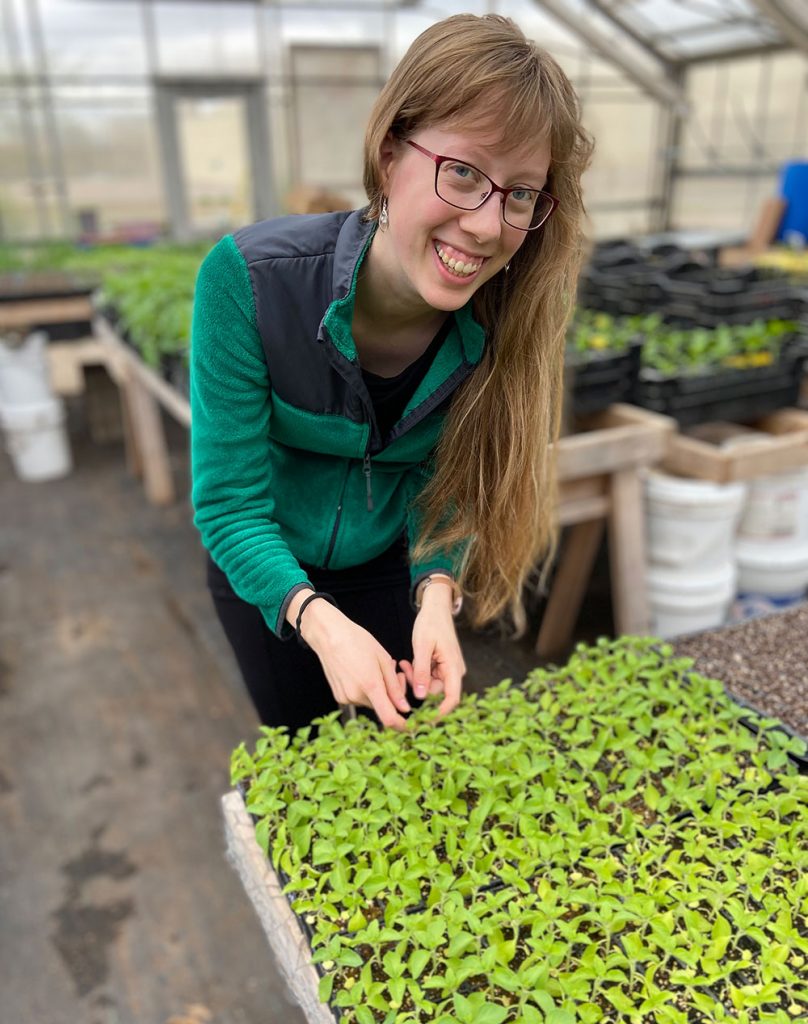
A lot of things are ending in my life right now. I am staring the end of my fellowship, my job, my current living situation, my MBA journey and my college career in the face. It’s exciting to look to the future, and at the same time, it’s daunting to think about all I am losing at once. I’m feeling a lot of emotions, ranging from grief to anxiety to frustration to excitement. Every day has been a roller coaster of processing what I’m going through. I think of how I will no longer have my own office in which to work. I will drive to work instead of walking across the street. The depth of understanding I have regarding the university and the MBA program’s inner workings, while helpful to me now, will mean absolutely nothing in my new environment. The relationships I’ve built at Farmshed and at the university, while still viable, will no longer be the same once I’m not working there regularly. I’m losing my two wonderful roommates (one is going to a whole new country in the fall), my current cozy apartment and its convenient location, the security of being in school and knowing what I am required to do, a lot of my college community who will continue school while I move on … there is a lot I’m giving up.
Obviously, I am gaining a great deal in this season of change as well. I am so excited to live with my former roommate again, this time in our own apartment instead of a dorm room. The apartment is beautiful and homey, and I get to explore a whole new neighborhood that has walking trails and is close to some of my newer friends and connections. My new job is in my desired field and will likely provide me a myriad of experiences that will help me grow as an accounting professional. I will get to expand my network with people there as well. I will be free to volunteer at Farmshed in a different capacity than I have been so far, like cooking in the kitchen or doing delivery driving, which I’ve been hoping to do ever since seeing Farmshed’s culture close up. I will have more evenings free, which I will likely fill up too fast, but I will no longer have schoolwork and student events to do. I will be earning more money and have a stable and consistent schedule. I have a lot to be thankful for, and I am really very excited to make these changes. I’ll have my own insurance through my work and can start contributing to my retirement funds while paying off my school debt. I’m finally becoming “an adult,” so to speak.
And yet, there are challenges I can’t foresee. How will I pursue the CPA exam? Do I still have a passion for that? If I do that, will all my evenings be filled with studying instead of schoolwork? Will I be even more isolated while doing “school”-type work than before because I’m not near my college friends? What will I struggle with at my job? How will I adjust to the new culture, and will I be able to find good friends there? Do I have all these aspirations about how I will live my life but won’t be able to sustain any of them? Will my roommate and I have struggles we’ve never had before? How long will I be at this new job, and where do I go from there? There’s so much uncertainty and possibility.
I’m wrestling with the changes, but even more importantly, I’m struggling through the transition. For my last professional development assignment, I am reading the book Transitions: Making Sense of Life’s Changes by William Bridges. It has helped me immensely by illuminating what is happening inside of me as I go through these changes. Sure, my circumstances are changing, but what determines how well I deal with the change is what I’m going through internally – that’s transition. An old life is dying. I will no longer be a college student, an MBA candidate, a graduate assistant, an MBA fellow. I will no longer be living near campus, and I won’t be the worship leader for InterVarsity. I won’t be in the same life stage as some of my friends, as they will be continuing on with college while I begin a career. Instead, I’m becoming a young professional with my whole life ahead of me. The internal change that I feel is that these things are dying and that I don’t know who I will become. From his experience, Bridges has identified three major stages of transitions, and it begins with endings. How backwards that feels! But it’s true. Something has to essentially die in order for there to be new growth; we can see this in nature, and I can see it in my own life. Who I was and how I did things in high school did not transfer over into college. I’m still me, but my life has changed as I take on more responsibility and gain more independence. I’m still finding out who I am, but the best I can do is be the me that I am now and allow life’s changes to transition me to who I am becoming.
As I face this ending, I also am looking ahead to the idle time between when I end my old life and when I begin everything new. Bridges focuses a big portion of the book on the “neutral zone,” the winter that readies the ground of my soul for the new growth I am about to experience. Part of me has already felt that in-between of not being where I was but not yet being where I will be. However, I think this will intensify after graduation weekend when I don’t have work, school, or my fellowship to keep me occupied. I’ll have some time with my family, and I plan to go visit my friend in Michigan for a few days, but I will still have a lot of time to myself and very little to fill it with other than contemplating who I am and where I’m going. I’m hoping this time will help me clarify what I want and how I’m going to approach my new season. However, I’m not there yet, so I cannot say for sure what that time will yield.
I also don’t know what the new beginning will be like. I have not moved yet, nor have I begun preparing in any way for my new job or my new life. With my personality, I have a natural tendency to focus on the here and now rather than looking ahead to the future. I have a hard time developing dreams or a vision for my life if I’ve never been in an environment like the one I’m about to enter. I like to get my feet wet and have a basic understanding of what I’m getting into when I begin things anew (my sister came to UWSP a year before I did; guess who I latched onto my first week?). I am approaching this transition one day at a time. I am reassured by a main theme in Bridges’ book: transitions happen in their own sweet timing, so don’t try to rush it or drag your heels. Follow the path that the transition leads you along and go at a pace that makes sense based on what your body and soul are able to sustain. I may not be approaching this perfectly, but I am doing what I know to do in order to not just cope or adjust but fully transition and be transformed by this significant life shift.
I don’t know if I’m ready for things to change. At the same time, I can’t wait for the changes to come and finally be settled. I’m wrestling, but in the middle, there’s this beautiful, bittersweet ending at Farmshed. We have such little time left, and a lot is changing within the organization, yet I feel that the groundwork we’ve been laying is creating a foundation that we can finally start building upon. There’s someone in an official role that will be taking over my responsibilities, and Bo and I are finally making some progress on the accounting procedures manual. I am so grateful for these last few weeks and will do my best to make the most of them!
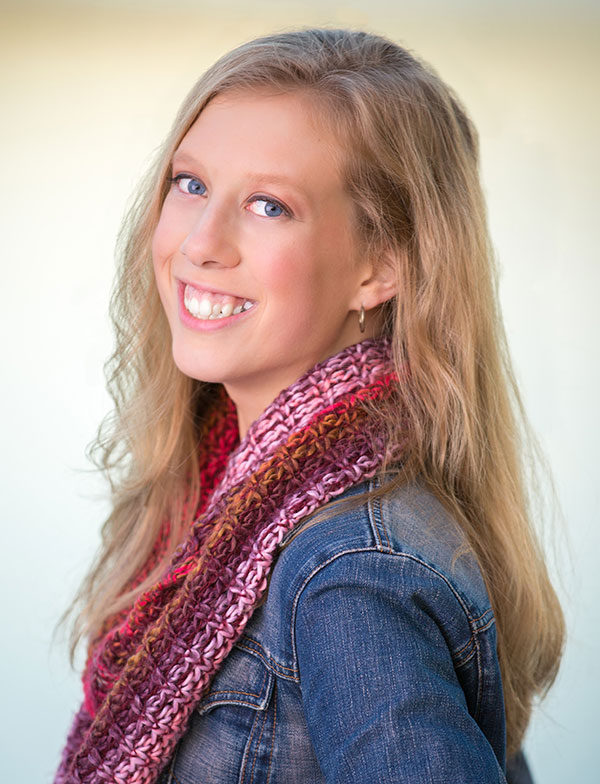
Abby Schmidt is a graduate assistant for the MBA program at the University of Wisconsin-Stevens Point as well as an MBA Fellow for Central Rivers Farmshed. She is also part of a research team in the process of creating a publication about the predictive value of grit on business retention. She recently graduated from UW-Stevens Point with degrees in accounting and business administration.

